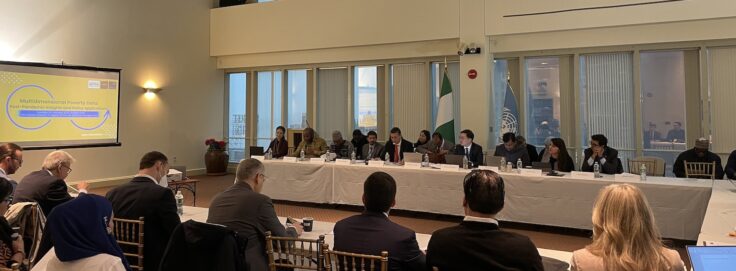
Search
Halfway to 2030 Agenda: Statisticians share progress on poverty reduction at MPPN Side Event to UNSC 54

28 February 2023 – The Multidimensional Poverty Peer Network (MPPN) was delighted to hold a side event today at the 54th session of the United Nations Statistical Commission (UNSC). The early-morning, but packed, event ‘Multidimensional Poverty Data: Post-Pandemic Insights and Policy Applications’ convened leading government statisticians from ten countries to share their insights and experiences on the use of Multidimensional Poverty Indices (MPIs) to guide policymaking in poverty reduction, and track and report progress on SDG indicators.
The United Nations Statistical Commission is the highest decision-making body of the global statistical system, drawing together Chief Statisticians from across the world. It is responsible for the setting of statistical standards and methodologies and sharing best practice on implementation at national and international levels.
Leading government statisticians represented South Africa, Nigeria, Malaysia, Paraguay, Sudan, Mongolia, Indonesia, Mexico, Colombia and Egypt at the MPPN Side Event.
As well as updates on the progress of national MPIs, topics discussed included the need to establish strategies to ensure MPIs are used by successive governments (Nigeria); moving to annual updates of the MPI (South Africa); merging registry data with MPI data to explore poverty among population subgroups (Colombia); the revision of indicators to monitor aspects such as digital gap (Malaysia); the use of MPI to target households for social programmes (Paraguay) and the challenge of communicating poverty statistics when poverty is rising (Mongolia).
It is hoped that the knowledge exchange at this Side Event helps support governments, agencies and other interested stakeholders in working towards better data for better lives. The event was kindly hosted by the Federal Government of Nigeria in Permanent Mission of the Federal Republic of Nigeria. Nigeria launched the Nigeria MPI (2022) last November.
Summary of the discussion
Risenga Maluleke, Statistician General, StatsSA, South Africa shared that the South Africa Multidimensional Poverty Index (SAMPI) would be updated using recent census data and updated annually using household survey data henceforth.
Prince Adeyemi Adeniran, Statistician General, National Bureau of Statistics, Nigeria described the Nigeria MPI (2022) which was launched in November 2022, and provides results down to senatorial district level across 4 dimensions and 15 indicators. He also outlined the communication strategies and ‘continuity mechanism’ they set up to ensure that the MPI, built by the NBS, is used by the incoming government following national elections.
Mohd Uzir Mahidin, Chief Statistician, Department of Statistics, Malaysia, shared plans to update indicators in Malaysia’s national MPI to cover the digital gap and social protection thus responding to the impact of Covid-19 on Malaysia’s 5 million informal workers. He also highlighted the possible learnings from a recent census round that could illuminate the MPI in due course.
Iván Mauricio Ojeda, National Director, National Institute for Statistics (INE), Paraguay, shared how Paraguay is using their national MPI for monitoring trends and for identifying households for social programmes such as free education for eligible students.
Ali Mohamed Abbas, Director General, Central Bureau of Statistics, Sudan updated attendees on the development of Sudan’s MPI, which started in 2022 with UNDP and the Central Bureau of Statistics and will use data from a new survey to fill a data gap. The MPI will be used to track progress in poverty reduction, facilitate the decentralisation of planning and resource allocation, and will illuminate disparities among diverse social groups.
Batdavaa Batmunkh, Chairperson, National Statistics Office, Mongolia shared the consultative process by which Mongolia developed a pilot MPI with five dimensions and 18 indicators that offers a detailed picture of multidimensional poverty across Mongolia. The issue remains of how to finalise the MPI as an official statistic and communicate results during an inflationary period.
Pak Kadir, Team Coordinator of Chief Statistician Materials Preparation, Central Bureau of Statistics (BPS), Indonesia discussed how Indonesia is working towards eradicating extreme poverty before 2030, including monetary and multidimensional poverty.
Ariadna Diaz, Presidency Advisors’ Coordinator, National Institute of Statistics and Geography (INEGI), Mexico discussed the challenges of data collection in a pandemic including using remote methods such as telephone surveys. The main source of data for the MPI is the national survey of household income and expenditure, which is usually conducted every two years. In 2020, a decision was made to update MPI quarterly. Pre-pandemic only the first quarter was completed, but this aligned with the strictest period of lockdown and so still produced useful insights.
Carlos Ramirez, Poverty Analysis Coordinator, National Administrative Department of Statistics (DANE), Colombia shared how a Ministry of Inequality had been established. He also discussed new work on ‘small area estimations’, distinguishing groups by features like ethnicity, gender, sexual orientation, and migration status with MPI data. Administrative registers of victims of violence are also being integrated with the MPI at DANE.
Ahmed Gamal, Statistician & Data Engineer, Central Agency for Public Mobilization and Statistics (CAPMAS), Egypt discussed plans for developing the Egyptian MPI consisting of 7 dimensions and 21 indicators. The process began in 2021 with CAPMAS, the Ministry of Planning and Economic Development, and the Ministry of Social Solidarity, supported by partners such as ESCWA, UNICEF and OPHI.
Sabina Alkire shared updates on new methodologies such as child poverty, gendered analyses, poverty and environment, and multidimensional inequality. She also shared several notes:
- If countries are not yet formally participating in the MPPN, please contact mppn@qeh.ox.ac.uk
- The 2023 technical OPHI Summer School (in Stata) on Multidimensional Poverty Measurement and Analysis will take place 4–14 July in Bogota, Colombia. Applications are now open.
- Samoa launched their MPI last week and the Islamic Republic of Mauritania will launch their national MPI on 1 March 2023.
- The global SDG Indicator database will update SDG 1.2.2 (national MPI) data in Spring 2023. Please request your SDG focal point to email your latest national estimations to Kazusa Yoshimura at the World Bank as soon as possible.
Concept Note for the MPPN side event to the UNSC 54th session
















